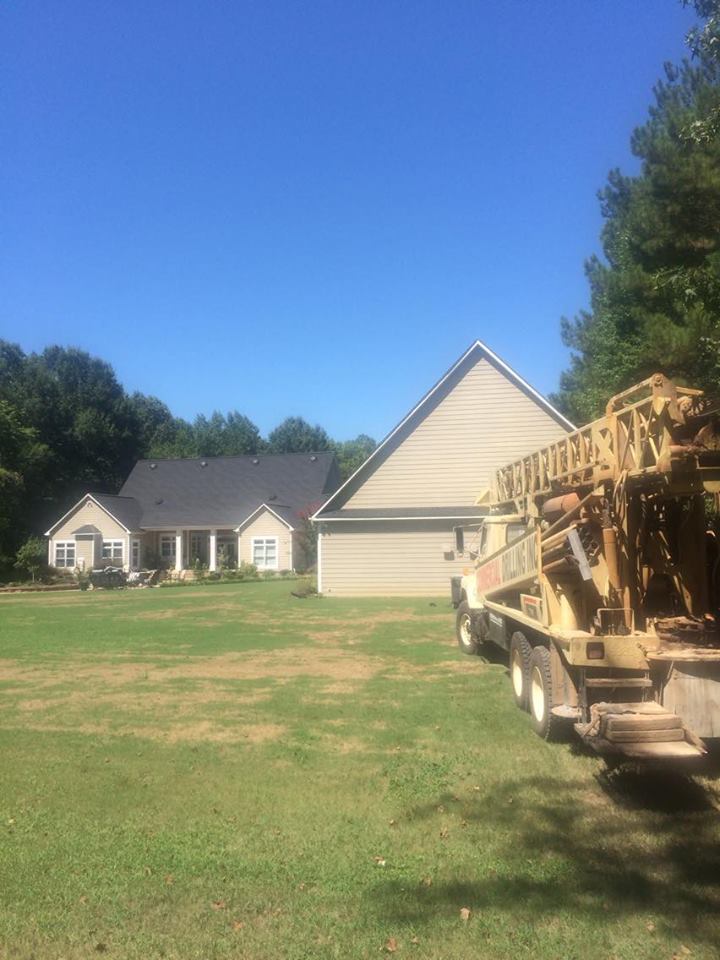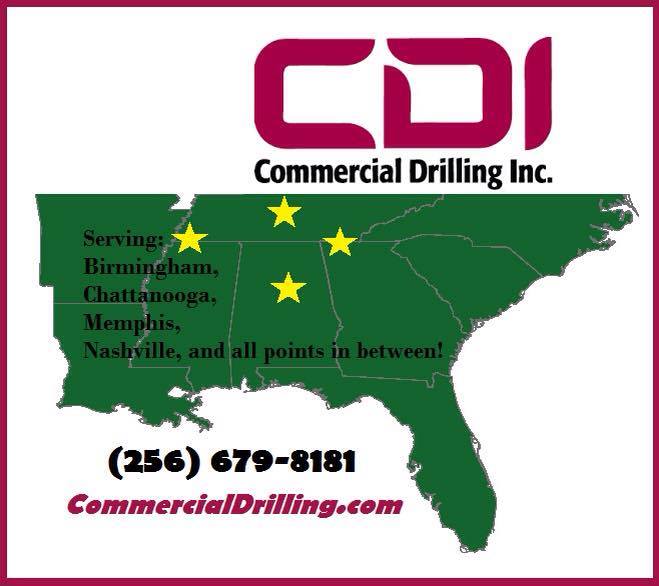Water Wells
At CDI, we offer the following:
- Pumps
- Tanks
- Filtration
- Repairs
- Commercial Services
- Residential Services
In addition to servicing the commercial industry, we serve families just like yours. If you have been considering drilling a well on your property, give us a call and see how we can help. We are a full service drilling company offering a complete line of any pumping system to meet the customer needs. It’s what we do!

Q: HOW IS A WELL DRILLED?
A: We begin drilling through the soil with a 10″ bit until bedrock is reached, usually between 50′ and 100′. We continue drilling into the bedrock approximately 10′. At that point, the 10″ bit is pulled from the well and a 6″ diameter pipe called “casing” is placed in the drilled hole. Then, a 6″ bit is lowered through the casing to the bedrock. Then we drill into the bedrock to obtain the water that is slowly flowing in the cracks in the strata. Various amounts of water flow in these cracks. Some fractures produce water flowing at a rate of one gallon per minute (gpm) while others over 100 gpm. When we hit enough water to feed your well, we stop drilling. Typically, a 200′ well producing 8 gpm is sufficient for domestic use.
Once we finish drilling, highly pressurized air is blown down the well to flush it clean of the drill cuttings/ stone dust. Then, the bit is pulled out of the well and grout is pumped down the outside of the well casing to fill in the gap between the casing and the original 10″ hole that was drilled.
Proper grouting is critical because it is the safeguard against surface water entering your well and contaminating the naturally fresh water underground.
This completes the well construction. A crew will then come on site to install the pump in the well, the storage tank in the basement, the water and electric lines from the well to the house, and a bug proof cap. The well will be chlorinated and tested for bacteria, nitrates, and various minerals. If there are any contaminates, we can install conditioning equipment to remove them. An estimate will be furnished at that time.
Q: HOW MUCH DOES A WELL COST?
A: On average, a well costs around $5,000.00-$7,000.00. This includes all costs pertaining to drilling and the installation of the pumping system. Conditioning equipment typically ranges from $1,500.00-$3,000.00.
Q: HOW DEEP SHOULD MY WELL BE?
A: The depth of your well will be determined by the amount of the water the well produces and how deep the water was obtained. The deeper the well, the less gallons per minute are needed because the 6″ diameter well acts as a reservoir. The deeper the well, the more water it will hold. Each foot of the well will hold 1.33 gallons of water. Therefore, 2 gpm is sufficient for a 600′ well but not for a 200′ well where 8 gpm would be needed.
Q: WHERE SHOULD MY WELL BE DRILLED?
A: There are many factors that will help determine the location of your well, including but not limited to: isolation distances from septic systems, future use of the property (for example, a pool), building foundations, property lines, trees, slope of the property and access for the drilling machinery. We will work with you for the final determination.
Q: WILL WE GET ENOUGH WATER?
A: Most wells in our region produce plenty of water for typical domestic use. Many wells supply enough for irrigation systems too. There are, however, some geological formations in which water is limited. We know most of these areas and will inform you if your property is in one of these areas.
Even low yielding wells produce enough water to fill large storage tanks on a timed schedule. They easily meet our customers’ water needs. So, a low yielding well does not have to be a major concern.
Q: WILL THE WATER BE CLEAN AND SAFE TO DRINK?
A: Since the earth is a natural filtration system, most well water is clean and safe to drink. It is not run off water in a reservoir or water from a river that could be contaminated, nor does it have sanitizing chemicals continually added to it, some wells can get bacteria in them. If bacteria intrude your well, usually a one time shock chlorination kills the source. It if does not, an Ultraviolet light system can be installed to destroy the bacteria. It is guaranteed to do so and it does not produce DBP’s (disinfectant by-products) like chlorine produces.
If iron, hardness, or sulfides are present, they can easily be removed with the proper conditioning equipment.
Q: HOW WILL I GET THE PROCESS STARTED?
A: Contact the drillers in your area you believe are trustworthy.
If you get more than one bid, compare them thoroughly to be sure you are comparing apples to apples. Be sure there are no hidden costs. Price is important but not everything. The least expensive is not always the best deal. Quality pays long term dividends.
Consider future service. Remember, you are looking to build a trusting long term business relationship with the company that drills your well.
Athens, AL 35611




